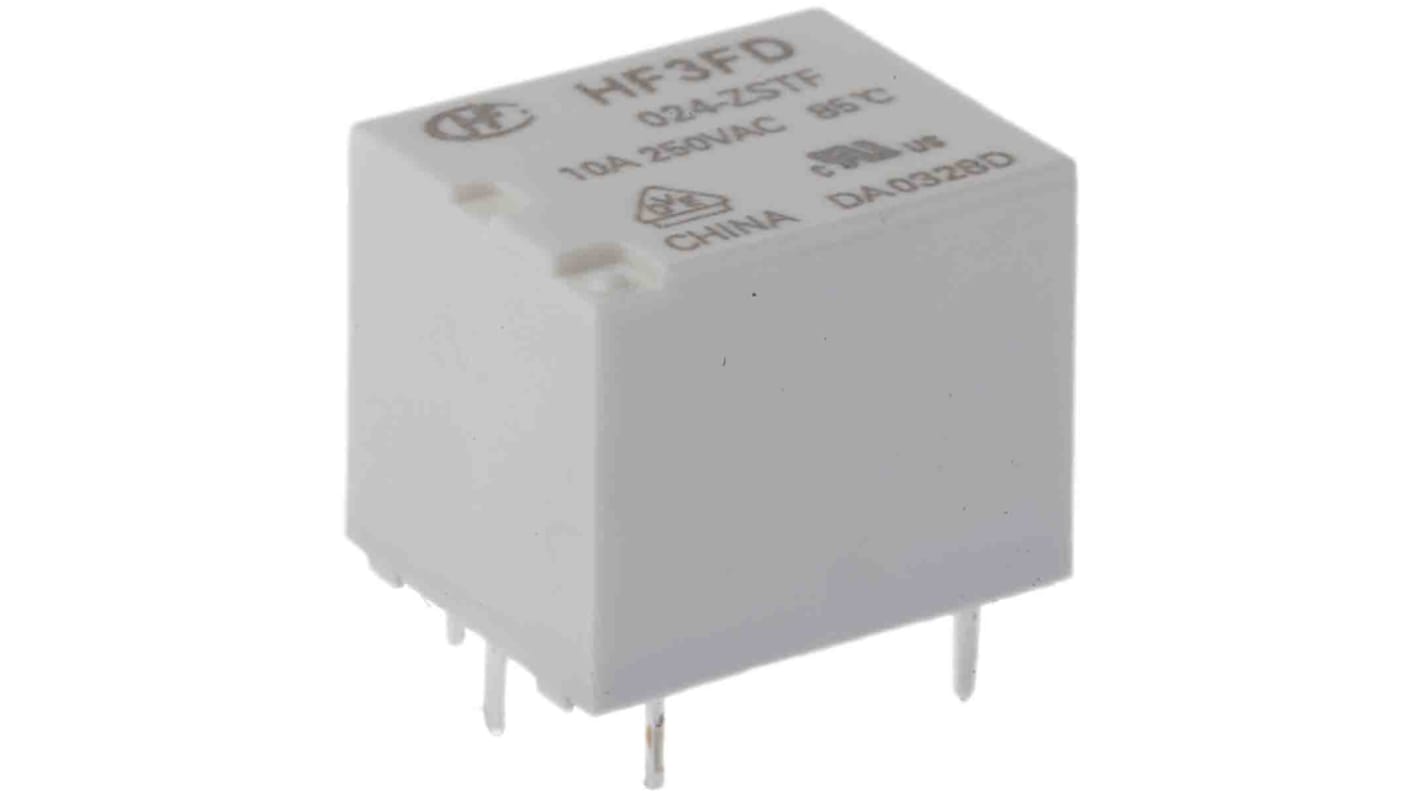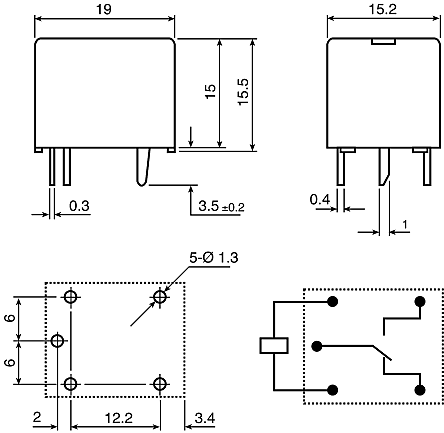RS PRO PCB Mount Power Relay, 24V dc Coil, 10A Switching Current, SPDT
- RS Stock No.:
- 476-618P
- Brand:
- RS PRO

Subtotal 25 units (supplied in a tube)*
£63.25
(exc. VAT)
£76.00
(inc. VAT)
FREE delivery for orders over £50.00
- 80 unit(s) ready to ship
- Plus 1,400 unit(s) shipping from 15 January 2026
- Plus 1,400 unit(s) shipping from 26 March 2026
Units | Per unit |
|---|---|
| 25 - 49 | £2.53 |
| 50 - 99 | £2.27 |
| 100 - 249 | £2.00 |
| 250 + | £1.78 |
*price indicative
- RS Stock No.:
- 476-618P
- Brand:
- RS PRO
Select all | Attribute | Value |
|---|---|---|
| Brand | RS PRO | |
| Coil Voltage | 24V dc | |
| Contact Configuration | SPDT | |
| Mounting Type | PCB Mount | |
| Switching Current | 10A | |
| Number of Poles | 1 | |
| Latching | No | |
| Terminal Type | Through Hole | |
| Maximum Switching Voltage AC | 277V ac | |
| Maximum Switching Voltage DC | 30V dc | |
| Length | 19mm | |
| Coil Resistance | 1600Ω | |
| Coil Power | 360mW | |
| Contact Material | Silver Alloy | |
| Maximum Operating Temperature | +105°C | |
| Life | 10000000 (Mechanical) cycles, 50000 (Electrical) cycles | |
| Standards Met | IEC 60335-1, RoHS Compliant, UL E134517, VDE 40014057 | |
| Depth | 15.2mm | |
| Minimum Operating Temperature | -40°C | |
| Isolation Coil To Contact | 2kV ac | |
| Height | 15.5mm | |
| Maximum Switching Power AC | 2.77 kVA | |
| Maximum Switching Power DC | 300 W | |
| Application | Power | |
| Select all | ||
|---|---|---|
Brand RS PRO | ||
Coil Voltage 24V dc | ||
Contact Configuration SPDT | ||
Mounting Type PCB Mount | ||
Switching Current 10A | ||
Number of Poles 1 | ||
Latching No | ||
Terminal Type Through Hole | ||
Maximum Switching Voltage AC 277V ac | ||
Maximum Switching Voltage DC 30V dc | ||
Length 19mm | ||
Coil Resistance 1600Ω | ||
Coil Power 360mW | ||
Contact Material Silver Alloy | ||
Maximum Operating Temperature +105°C | ||
Life 10000000 (Mechanical) cycles, 50000 (Electrical) cycles | ||
Standards Met IEC 60335-1, RoHS Compliant, UL E134517, VDE 40014057 | ||
Depth 15.2mm | ||
Minimum Operating Temperature -40°C | ||
Isolation Coil To Contact 2kV ac | ||
Height 15.5mm | ||
Maximum Switching Power AC 2.77 kVA | ||
Maximum Switching Power DC 300 W | ||
Application Power | ||
- COO (Country of Origin):
- CN
Subminiature Relays
2kV dielectric strength (between coil and contacts)
UL94, V-0 flammability class
Class F insulation
Wash tight
Conforms to CTI 250 & VDE 0631/ 0700
Standards
Approvals

RS PRO 10 A SPDT Non-Latching Relay
Today, we are proudly introducing our own branded RS PRO SPDT Relay giving you environmentally friendly product without compromising high standards of IP67, meaning protection against dust, sand and water.
Relay rating is showing in ac and dc, and it is crucial never to exceed the maximum switching voltage. Our SPDT (single pole, double throw) Relay provides 277 V ac and 30 V dc telling you about the specific amount of power that can be switched through the Relays.
Our range of Non-Latching Relays are reliable, well-respected electronics, offering you competitive price range without compromising quality and you can be sure to find them in stock. If you are looking for more specific information, you can check our datasheet that should answer your burning questions.
Features and Benefits
- Value for money Non-Latching Relay
- Subminiature, standard PCB layout
- Meets IP67 rating
- Lead free and cadmium free
- 2.5 KV dielectric strength (between coil contacts)
- Flammability class according to UL94, V-O
- RoHS and WEEE compliant
- Conforms to CTI 250 and VDE 0631/0700
Applications
- Automotive engines
- Household applications
- Industrial machinery
- Medical equipment
- Telecommunications equipment
Frequently asked questions
Both types of relays in similar in design and function; however, a significant difference between them is that a latching relay will remain in the last position when it was last powered. In contrast, a non-latching goes back to its normal position. This makes each more type of Relay suitable for different applications.
Does it make much difference which way a Relay is installed?
If the coil polarity is backwards, the coil is ultimately shorted by the diode every single time you try to turn it on. Therefore, Relays must always have the correct position (correct polarity); otherwise, it is a matter of time before smoke will appear, meaning Relays are polarity sensitive.
